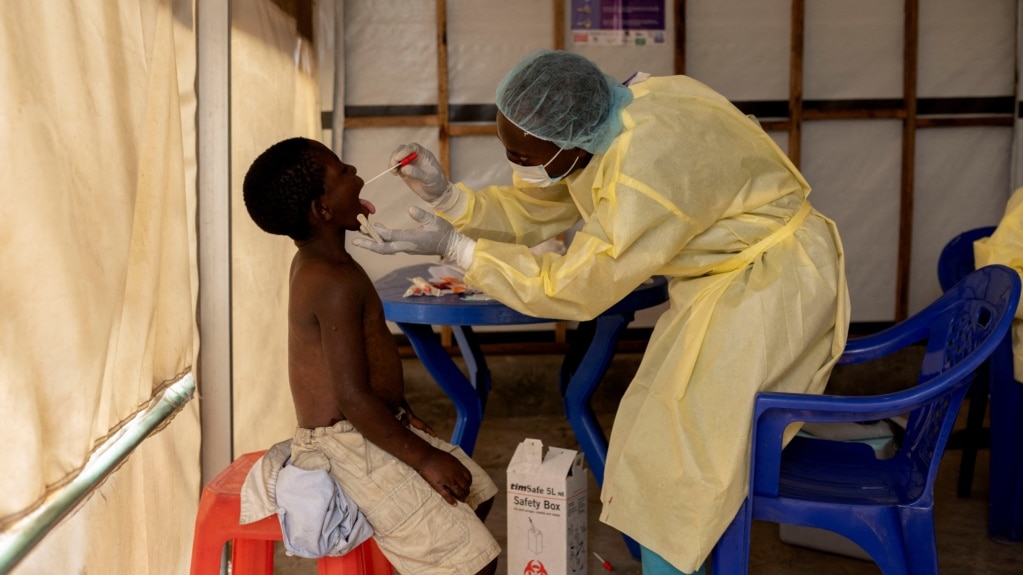The World Health Organization is calling for donations to fight the latest outbreak of the viral disease mpox in Africa.
The U.N. health agency declared mpox in Africa a "public health emergency of international concern" last week.
The director-general of the WHO, Tedros Adhanom Ghebreyesus, made the announcement after a meeting of the WHO’s emergency committee. The move follows a declaration by the Africa Centers for Disease Control and Prevention (Africa CDC). That organization declared mpox a public health emergency in Africa one day earlier.
The WHO said there have been more than 14,000 cases and more than 524 deaths in Africa this year. So far, about 96 percent of all cases and deaths have taken place in one country: the Democratic Republic of the Congo. But the WHO and others are concerned that a new version of the viral disease could spread more easily among people.
The Associated Press recently reported some of the information known about the current mpox outbreak.
What is mpox?
Mpox is also known as monkeypox. The United States Centers for Disease Control and Prevention says the viral disease was first identified by scientists in 1958 when outbreaks of a “pox-like” disease appeared in monkeys. Until recently, most human cases involved people in central and West Africa who had contact with infected animals.
In 2022, experts confirmed that the virus could be spread through sex. Outbreaks were reported in more than 70 countries that had not reported the disease before.
Mpox belongs to the same virus family as smallpox. It causes symptoms like high body temperature, chills and body pain. People with serious cases can develop lesions on the face, hands, chest and sex organs.
What is happening in Africa?
The number of cases has increased sharply in the last few weeks. The Africa CDC said the disease has been identified in at least 13 African countries. Compared to the same period last year, the agency said cases have increased by 160 percent and deaths by 19 percent.
The version of mpox seen in the Democratic Republic of the Congo could kill up to 10 percent of people infected. Unlike earlier mpox outbreaks, where lesions were mostly seen on the chest, hands and feet, the new form of mpox causes less severe symptoms. This could make the disease harder to identify.
The WHO said mpox was recently reported for the first time in four East African countries: Burundi, Kenya, Rwanda and Uganda. All of those cases were linked to the Democratic Republic of the Congo. In the Ivory Coast and South Africa, health officials have reported a less dangerous version of mpox than the one that spread in 2022.
The WHO’s declaration
The WHO’s emergency declaration is meant to get donors to provide money for a campaign against the disease.
African CDC Director General Dr. Jean Kaseya said the agency’s declaration of a public emergency was meant “to mobilize our institutions, our collective will and our resources.”
Michael Marks teaches medicine at the London School of Hygiene and Tropical Medicine. He said, “It is clear that current control strategies aren’t working and there is a clear need for more resources.”
What is different from 2022?
Most of the cases during the 2022 outbreak of the viral disease were gay and bisexual men. The virus was spread through close contact and sex.
Although similar things are happening in Africa, children under the age of 15 now make up more than 70 percent of mpox cases and 85 percent of deaths in the Democratic Republic of the Congo.
WHO chief Tedros said officials are dealing with several outbreaks and, what he called, “different modes of transmission and different levels of risk.”
Greg Ramm is with the aid group Save the Children. He said his organization is worried about mpox spreading in crowded refugee camps. He said there were 345,000 children living in unhealthy conditions in the eastern Democratic Republic of the Congo. Ramm added that the country’s health system is already “collapsing” because of malnutrition, measles and cholera.
Dr. Boghuma Titanji is an infectious disease expert at Emory University in the American state of Georgia. She said it is unclear why the disease is mostly affecting children in the Democratic Republic of the Congo. She said children might become infected more easily or social conditions like overcrowding or infected parents might explain the problem.
How might mpox be stopped
The AP says in 2022, developed countries stopped the outbreak of mpox with treatments and vaccines. But few vaccines are available in Africa.
Marks said the immunization would likely help — including vaccination against the similar smallpox virus. He said, “We need a large supply of vaccine so that we can vaccinate populations most at risk.” He said that would mean vaccinating children, sex workers and adults in affected areas.
The WHO has already released $1.45 million of emergency money for mpox. But the U.N. agency says $15 million is needed to start efforts to combat the disease.
I’m Mario Ritter, Jr.

